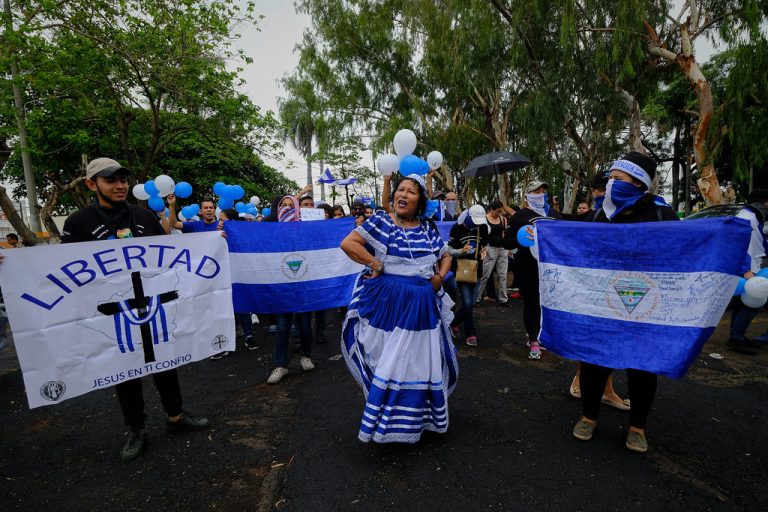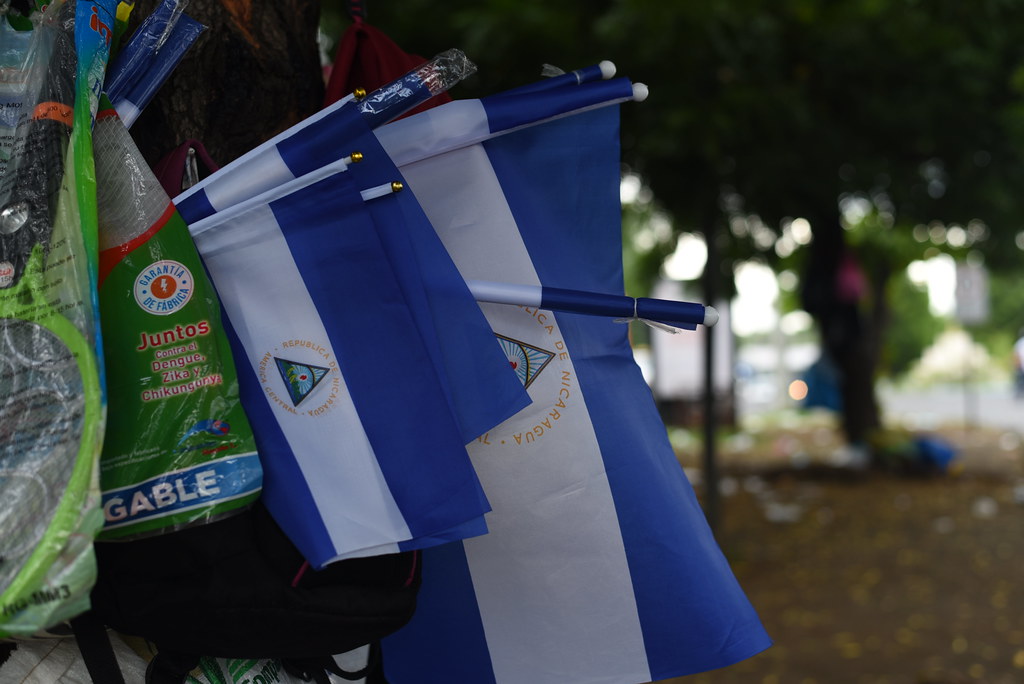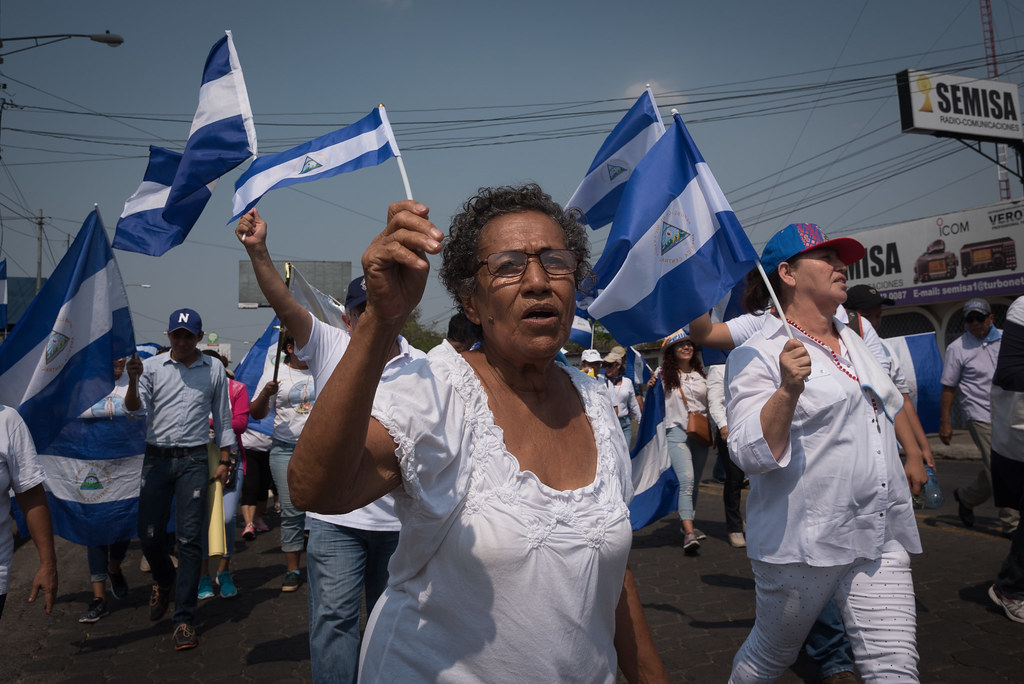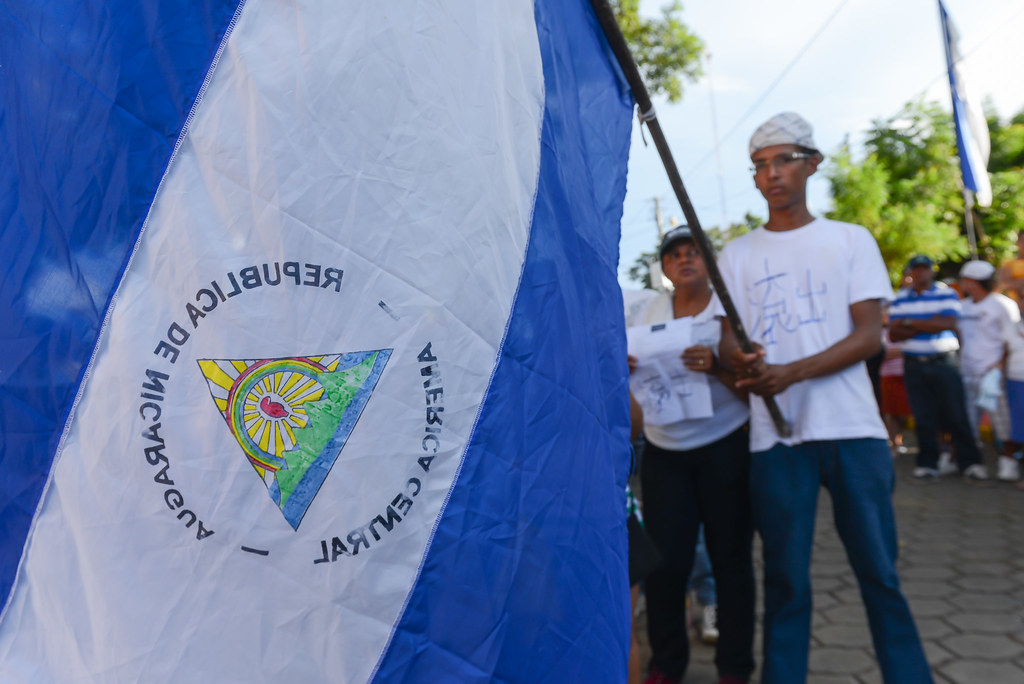17 de septiembre 2020

Children of Exile: The Births “Sowing Hope” in the Camp of Nicaraguan Farmers

PUBLICIDAD 1M
PUBLICIDAD 4D
PUBLICIDAD 5D
The National Police illegally seizes plastic flags for supposedly including a rainbow that resembles a paving stone barricade, a symbol of protest

Nicaraguan citizens protest against Daniel Ortega's regime in Managua. Photo: Confidencial
A year ago, the Ortega-Murillo regime prohibited raising the Nicaraguan flag in homes or carrying it on vehicles. This year, a month prior to the Independence Day holidays, the National Police seized national flags for supposedly including a rainbow that resembled a barricade made out of paving stones.
The most popular case of a confrontation between the National police and a merchant has been that of Tania Isabel González Solís, 38, who on August 25 was dragged away by officers of San Carlos, Rio San Juan, when they tried to snatch a roll of national flags that she sold in a hardware store on her property.
The merchant was held for four hours at the local police station. Officers seized the flags on the grounds for allegedly altering the national symbols. González responded to the agents by saying that the vice president and state spokesperson, Rosario Murillo, was the first to distort national symbols such as the national shield. “I told the policemen ‘If you look at the shield that appears as a letterhead in all state documents, it is a shield for a clown, because it doesn’t have all the colors and it’s deformed”, reported La Prensa newspaper.
In the following days, police officers toured the markets to “inspect” the flags sold by merchants and bookstores. “They came without any (judicial) order, simply telling me they were going to check the flags. The officers started taking photos and took them without further ado, they did not provide a record of their operation,” Miguel Ángel Urbina, merchant of the Iván Montenegro market, told CONFIDENCIAL.
The National Police illegally seized at least 100 plastic flags from the merchant. “The problem is that the flag became politicized. It has always been sold during the national holidays, and it has been sold freely and without questions”, said Urbina.
“I don’t know why the police say that the flag is vandalized this year. I have always sold it and to me, it’s the same Nicaraguan flag”, he declared.

Photo: Merchants use to sell freely Nicaragua flags in the streets. Photo: Confidencial
Urbina explained that he felt “uncomfortable and upset” because nearly a dozen police officers arrived “as if I were a criminal”.
“I have been at this market for about forty years. I am a founder and I have never had any problems. I have never been to prison. I have been an apolitical man”, he says. However, in the market, there is fear among the merchants.
The persecution against the flag has caused many to opt for not selling them or only selling those “approved” by the Police, which in this case are the ones made out of cloth or satin, which are sold at a price of 35 to 100 cordobas (depending on the size), as opposed to the plastic flags that cost about five cordobas.
Hellen Rivas, a merchant at the Ivan Montenegro market, indicates that in order to avoid a police seizure, they prefer not to invest in plastic ones. “We sell a paper flag, which we have had for about two years, and a cloth one that we always sell for this time of the year”, she says.
Yamileth Bonilla, a seller at the Roberto Huembes market, added that “people buy flags with fear. Personally, they have told me: ‘take the stick out and give it to me in a black bag’, and that’s how they take it. That is what happens, unfortunately, that is what we’re experiencing’.

The Nicaraguan flag has become a symbol of resistance and a target for the Ortega-Murillo regime. Photo: Carlos Herrera | Confidencial
The criminalization of the national flag began after it became a symbol of the 2018 civic uprising. The National Police, paramilitaries, and Ortega fanatics have harassed, attacked, and detained any citizen who carried it in their vehicle.
One of the best-known cases is that of Professor Humberto Hernández, harassed and summoned by police, for traveling through the streets of the city of Camoapa, in the department of Boaco, carrying a blue and white flag on his motorcycle.
“They want to turn off all sources of resistance, they want to turn off all sources of free thought, and that is impossible, only an insane person can believe that we are all going to think the same,” Hernández said to CONFIDENCIAL about the regime.
Another widely publicized case was that of the construction businessman, opponent, and father-in-law of one of Ortega’s son, Lolo Blandino, detained on more than one occasion for having Nicaraguan flags waving from the windows of his vehicle. Or the case of lawyer Avil Ramírez Mayorga, detained by the National Police for waving the national flag on the highway that leads to the city of Masaya.
All of them have been persecuted by the regime and several are being kept under surveillance. However, they say they will not give up on carrying the white and blue flag.
Flor Ramírez, who has been persecuted for carrying the national flag and wearing the colors blue and white, said that “we take the flag as a national symbol, representative of our libertarian struggle because had no weapons and no way to defend ourselves”, she pointed out. “Doña Flor”, as she has been called in the protests, became popular after wearing a blue and white huipil, with braids in the same color.
“We used our flag as a shield so that Ortega’s guard would not do anything to us, but it was the complete opposite, they were snatched, trampled on and burned”, Ramírez emphasizes.

Photo: Confidencial
For Guillermina Zapata, mother of Fransisco Reyes, who was shot in the head during the “Mother of all Marches” protest on May 30, 2018, the Nicaraguan flag also represents one of the last memories of her son. That afternoon, those who helped Francisco tried to cover his wound with a blue and white flag. Today, his mother still keeps the bicolor banner with traces of her son’s blood.
The Police “is coward”, said the member of the Association of Mothers of April, after questioning that “the blue and white flag should be respected, and it is not a crime to have a blue and white flag, but it is a crime to them”.
Jonathan López, a university student and former political prisoner of the dictatorship, considers that the national flag “is an essential part of our identity as Nicaraguans.”
It reminds him of “the commitment to our nation, and our culture. It represents our history, fighting for a single purpose”, which he described as “achieving the well-being of our society, and mainly that we must work for the needs collective, and not for individual interests”.
“The meaning of the Nicaraguan flag has changed a lot since April”, reflects Amaya Coppens, a university student and political prisoner on two occasions.
“Before that, they had turned it into an almost trite symbol that we only saw during national holidays or during formal events, due to the dictatorships repeated attempt to replace it with garish colors and party flags; now it has become a much deeper symbol, especially because it brings the different struggles of the Nicaraguan people, with their complex diversities and demands, together”.
Coppens states that the regime “has trampled and attacked the flag, in the same way, it has imprisoned and prosecuted those who have dared to fly it.”
The young woman assured that “what this flag truly represents is a threat to the dictatorship that oppresses us.” To raise it in these conditions, she maintained, “ takes courage and dignity, which this dictatorship ran out of long ago, but the people of Nicaragua have plenty of it.”
This article has been translated by our staff*
PUBLICIDAD 3M
Confidencial es un diario digital nicaragüense, de formato multimedia, fundado por Carlos F. Chamorro en junio de 1996.
PUBLICIDAD 3D